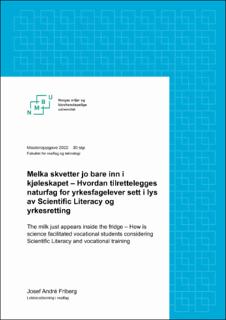| dc.contributor.advisor | Johansen, Gerd Eli | |
| dc.contributor.author | Friberg, Josef André | |
| dc.date.accessioned | 2023-01-04T08:36:07Z | |
| dc.date.available | 2023-01-04T08:36:07Z | |
| dc.date.issued | 2022 | |
| dc.identifier.uri | https://hdl.handle.net/11250/3040832 | |
| dc.description.abstract | Denne masteroppgaven undersøker forskningsspørsmålet: «Hvordan tilrettelegges naturfag for yrkesfagelever sett i lys av Scientific Literacy og yrkesretting». I den nye læreplanen har det kommet inn tre tverrfaglige temaer. Som blant annet har som mål at elever skal leve mer bærekraftig, være i stand til å selv vurdere holdninger, kilder og informasjon de blir presenterte, og ta stilling til validiteten av disse. Dette krever at elevene får naturfagundervisning som legger til rette for at de tilegner seg kompetanse til å kunne ta stilling til de situasjonene de møter, og til å kunne være kritiske.
For å besvare forskningsspørsmålet har studien hatt en kvalitativ tilnærming ved intervju av fire lærer i naturfag for yrkesfag ved ulike skoler. Hvor tilretteleggingene de har gjort settes i lys av Scientific Literacy og ulike former for yrkesretting. Videre har det også blitt intervjuet to elevgrupper som hvor deres syn på yrkesretting har blitt satt opp mot yrkesrettingene som læreren beskrev.
Studien viser at lærerne i stor grad brukte lignende former for tilrettelegging, som også ble plassert relativt likt med tanke på visjonene i Scientific Literacy. Og at mye av tilretteleggingen på yrkesfag er yrkesrettet og kontekstbasert. Samt at både lærere og elever er svært positive til den nye læreplanen som legger til rette for mer yrkesretting. | en_US |
| dc.description.abstract | This master's thesis examines the research question: "How is science facilitated for vocational students considering Scientific Literacy and vocational training". In the new curriculum, three interdisciplinary themes have been introduced. Which aims, among other things, for students to live more sustainably, to be able to self-assess attitudes, sources and information they are presented with, and to decide on the validity of these. This requires that students receive science education that lays the foundation for them to acquire competence to be able to take a stand on the situations they encounter, and to be able to be critical. To answer the research question, the study has taken a qualitative approach by interviewing four science teachers for vocational subjects at different schools. Where the arrangements they have made can be seen in the light of Scientific Literacy and various forms of vocational guidance. Furthermore, two groups of pupils have also been interviewed, where their views on vocational guidance have been compared to the vocational guidance described by the teacher. The study shows that the teachers largely used similar forms of planning, which were also positioned relatively equally with regard to the visions of Scientific Literacy. And that much of the preparation for vocational subjects is vocationally oriented and context-based. And that both teachers and pupils are very positive about the new curriculum, which facilitates more vocational guidance. | en_US |
| dc.language.iso | nob | en_US |
| dc.publisher | Norwegian University of Life Sciences, Ås | en_US |
| dc.rights | Attribution-NonCommercial-NoDerivatives 4.0 Internasjonal | * |
| dc.rights.uri | http://creativecommons.org/licenses/by-nc-nd/4.0/deed.no | * |
| dc.subject | Naturfag | en_US |
| dc.title | Melka skvetter jo bare inn i kjøleskapet : hvordan tilrettelegges naturfag for yrkesfagelever sett i lys av Scientific Literacy og yrkesretting | en_US |
| dc.title.alternative | The milk just appears inside the fridge : how is science facilitated vocational students considering Scientific Literacy and vocational training | en_US |
| dc.type | Master thesis | en_US |
| dc.description.localcode | M-LUN | en_US |

